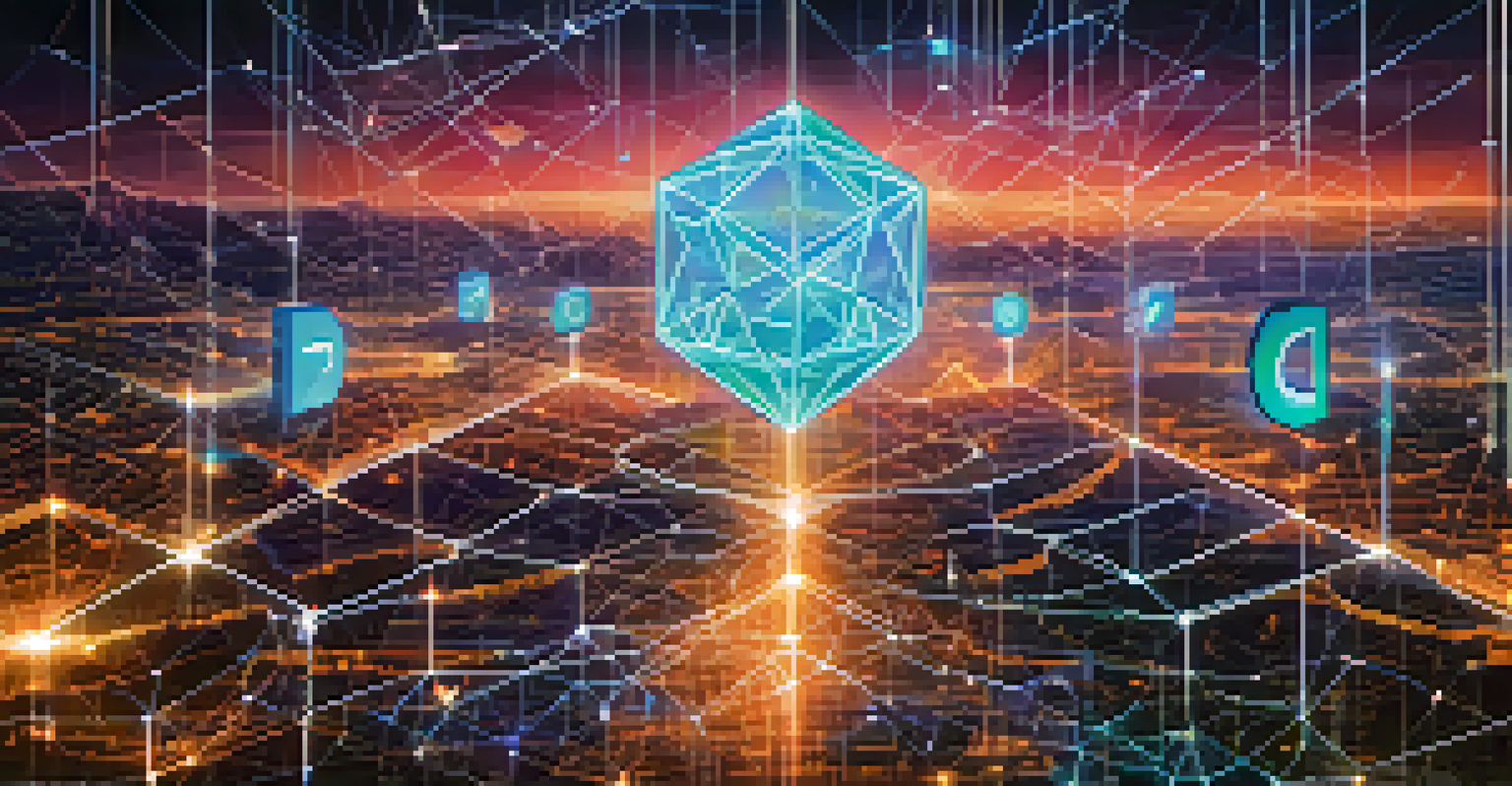Smart Contracts: The Backbone of Decentralized NFT Marketplaces

Understanding Smart Contracts in Simple Terms
At their core, smart contracts are digital agreements coded into a blockchain. They automatically execute transactions when specific conditions are met, eliminating the need for intermediaries. Imagine a vending machine: you insert money and select an item, and the machine delivers it without any human involvement. That's similar to how smart contracts work, providing efficiency and security in digital transactions.
Smart contracts are the digital equivalent of a vending machine: you insert the right input and get the desired output without needing a middleman.
These contracts are immutable, meaning once deployed, they cannot be changed, which ensures transparency and trust. This characteristic is crucial in the world of Non-Fungible Tokens (NFTs), where authenticity and ownership are paramount. Smart contracts help ensure that every transaction related to an NFT is recorded and verifiable on the blockchain, making it easy to track ownership.
In the context of decentralized NFT marketplaces, smart contracts enable seamless buying, selling, and trading of digital assets. They allow creators to set their own terms, such as royalties for future sales, providing greater control over their work and revenue. This decentralization not only empowers artists but also creates a fairer marketplace for collectors.
The Role of Smart Contracts in NFT Transactions
When you purchase an NFT on a decentralized marketplace, smart contracts are the behind-the-scenes technology that makes it all happen. Upon buying an NFT, the smart contract verifies the transaction details, such as the buyer's wallet and the seller's terms, before executing the transfer of ownership. This process is quick and eliminates the potential for fraud, as everything is recorded on the blockchain.

Moreover, smart contracts enhance the security of transactions. Each contract is linked to the digital asset and the blockchain, creating a tamper-proof record. If someone tries to alter the transaction details, the network would reject it, ensuring that only legitimate transactions are processed.
Smart Contracts Automate Transactions
Smart contracts execute transactions automatically when predefined conditions are met, enhancing efficiency and security in digital agreements.
This level of security is particularly appealing to collectors and investors, who want assurance that their purchases are authentic. With smart contracts, buyers can confidently engage in transactions, knowing that their ownership rights are protected and the history of the NFT is transparent.
Decentralization: The Heart of NFT Marketplaces
Decentralization is a fundamental principle of blockchain technology, and it plays a vital role in NFT marketplaces. Unlike traditional platforms that are controlled by a single entity, decentralized marketplaces operate on a peer-to-peer model. Smart contracts facilitate this by allowing users to interact directly with one another, bypassing the need for a central authority.
In a world where authenticity is paramount, smart contracts provide a trustworthy way to verify ownership and provenance of digital assets.
This approach not only fosters a sense of community among artists and collectors but also encourages innovation. Creators can experiment with new concepts, and collectors can discover unique NFTs without being restricted by platform rules. The flexibility afforded by decentralized marketplaces helps to drive the NFT ecosystem forward.
Additionally, decentralization helps reduce costs associated with transaction fees, which can be a burden on traditional platforms. With smart contracts handling transactions directly, users can save money while also enjoying a wider range of options for buying and selling NFTs.
The Benefits of Using Smart Contracts for Creators
For artists and creators, smart contracts offer numerous advantages that enhance their ability to monetize their work. One significant benefit is the ability to program royalties directly into the smart contract. This means that every time an NFT is resold, the original creator automatically receives a percentage of the sale, providing ongoing revenue.
This feature empowers creators by ensuring they are compensated fairly for their work, even after the initial sale. Traditional art markets often lack such mechanisms, leaving artists at the mercy of resellers. With smart contracts, creators can maintain a continuous relationship with their audience and supporters.
NFT Ownership is Easily Verified
Smart contracts provide a transparent and immutable record of ownership on the blockchain, allowing buyers to verify the authenticity of NFTs confidently.
Moreover, smart contracts allow artists to set specific terms for their NFTs, such as usage rights or licensing agreements. This control over their digital assets not only strengthens their brand but also enhances the value of their creations in the market.
Smart Contracts and NFT Ownership Verification
One of the most significant challenges in the digital art world has been ensuring the authenticity and ownership of creations. Smart contracts play a crucial role in solving this issue by providing a transparent and immutable record of ownership on the blockchain. When an NFT is minted, the smart contract creates a unique identifier that is linked to the creator's wallet address.
This unique identifier serves as a digital fingerprint for the NFT, making it easy to verify its authenticity. Buyers can confidently purchase NFTs, knowing that the ownership history is publicly accessible and verifiable. This transparency builds trust within the community and encourages more people to participate in the NFT space.
Furthermore, smart contracts can also include metadata that details the NFT's provenance, including previous owners and sale prices. This additional information enhances the value of the NFT, as collectors often seek pieces with rich histories and strong provenance.
Challenges and Limitations of Smart Contracts in NFTs
While smart contracts offer numerous benefits, they are not without challenges. One of the primary concerns is the potential for bugs or vulnerabilities in the code. If a smart contract contains flaws, it could lead to losses for users, as seen in several high-profile hacks in the crypto space. This emphasizes the importance of thorough testing and auditing before deploying contracts.
Additionally, the complexity of smart contract coding can be a barrier for many creators who lack technical expertise. As the NFT market grows, there is a pressing need for user-friendly platforms that allow artists to utilize smart contracts without requiring extensive programming knowledge. Simplifying the process could help more creators enter the marketplace.
Decentralization Empowers Creators
Decentralized marketplaces, facilitated by smart contracts, empower artists by allowing them to set their own terms and earn royalties on resales.
Finally, there is ongoing debate about the environmental impact of blockchain technology, particularly regarding energy consumption. As more users engage with NFT marketplaces, it's essential for developers to explore energy-efficient solutions to mitigate these concerns and promote sustainability within the industry.
The Future of Smart Contracts in NFT Marketplaces
The future of smart contracts in NFT marketplaces looks promising, as technological advancements continue to enhance their functionality and accessibility. With the rise of layer 2 solutions and more efficient blockchain protocols, we can expect faster transactions and lower fees, making the NFT buying and selling experience even more seamless. These improvements will likely attract a broader audience to the NFT space.
Moreover, as more creators recognize the benefits of smart contracts, we may see an increase in innovative uses for NFTs beyond digital art. From virtual real estate to gaming assets, the possibilities are endless. This diversification will drive the demand for smart contracts, further solidifying their role in decentralized marketplaces.

Ultimately, the evolution of smart contracts will play a crucial role in shaping the future of NFTs, fostering a more inclusive, transparent, and vibrant marketplace for creators and collectors alike.